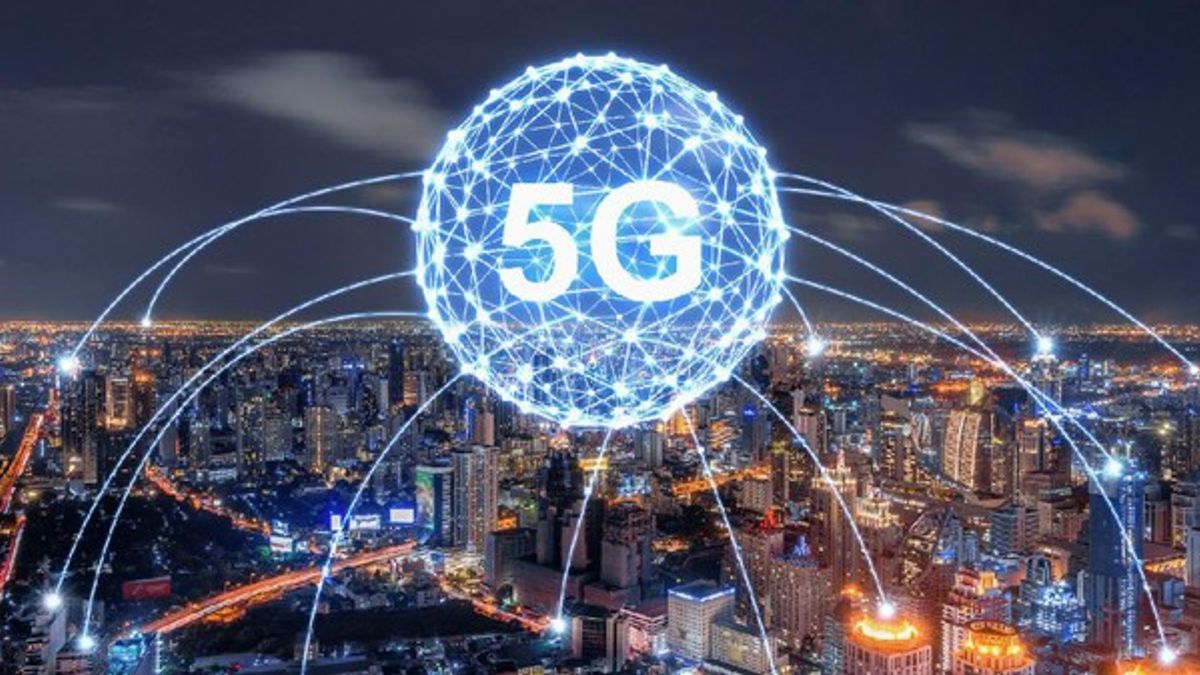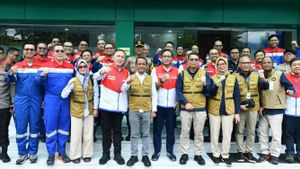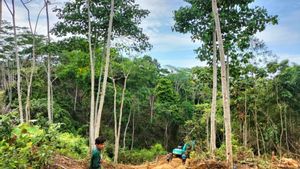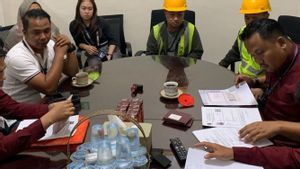JAKARTA - For years, Indonesia was given false hopes with a discourse to immediately adopt the 5G internet network. Until now, the government is considered too slow to solve it.
Based on the 5G adoption index report, Indonesia is quite far behind neighboring countries such as Singapore, Malaysia, Thailand and Vietnam in terms of 5G network readiness.
Indeed, cellular operators in Indonesia have started testing 5G networks since 2017. But only for use in the industrial sector, not for commercial consumers.
However, recently the Ministry of Communication and Information Technology (Kemkominfo) has shown a bright spot to immediately implement the 5G network. This can be seen when the Ministry of Communication and Information began to auction off a 2.3 GHz radio frequency slot in the 2,360 to 2,390 MHz range.
Kominfo stated that the addition of frequency bands can increase the capacity for telecommunication services to the public. He also said that this effort was to support digital transformation in the economic, social and government sectors.
"The selection of users of the 2.3 GHz radio frequency band aims to increase the capacity of cellular mobile networks, to maximize service quality, and to accelerate the deployment of ICT infrastructure with fifth-generation technology (5G)," explained Kominfo in its official statement, Friday, November 20. .
The frequency auction has actually been recorded in the provisions in Article 11 of the Regulation of the Minister of Communication and Information Technology Number 9 of 2018 concerning Operational Provisions and Licensing Procedures for Radio Frequency Spectrum Usage.
Later, the 5G network will offer new applications with higher specifications and better services than 4G, as well as open new business opportunities for both mobile operators, platform providers and other business actors.
Even though it looks tempting, in adopting this 5G network, the government will have homework (PR) such as the community ecosystem, infrastructure to regulation.
According to the Director General of Resources and Equipment of Post and Information Technology (Dirjen SDPPI) KemKominfo Ismail, as quoted from Katadata, there are two important challenges that must be overcome in the development of 5G in Indonesia. First, cable fiberization or efforts to modernize the network by connecting BTS through fiber lines.
"There will be a slowdown or bottlenecking in the networks of each operator, so that people do not get the maximum benefits of 5G," said Ismail.
For that, all base transceiver stations (BTS) must be updated. Others, such as microwave signal transmitting devices, are converted into optical fiber on cables. Without fiberization, the internet speed with the implementation of 5G will not be optimal.
It doesn't want to repeat the same mistakes from implementing 2G to 4G. Therefore, infrastructure including fiber networks wants to be prepared before implementing 5G.
The second stage involves harmonizing regulations with local governments (pemda). This is to provide telecommunication operators with more convenience and flexibility in accessing poles, channels and buildings when building a 5G network.
On the other hand, Ismail stated that earlier this year several times he had asked operators to immediately complete the construction of BTS infrastructure connected to fiber optic cables for the 5G network. The development is expected to be carried out before the government frees up band frequencies that can be used by operators to deploy 5G networks.
"It is no less important that before talking about 5G, all operators must prepare for fiberization, the connection must be between BTS and optical cables. Fiberization in the 4G era can be done," said Ismail.
How Far is 4G Equity?Even though it has been heralding the adoption of a 5G network soon, in fact there are still many areas in Indonesia that do not have a 4G network.
This statement was also conveyed by the Minister of Communication and Information, Johnny G Plate some time ago. Johnny stated that there are still 3T (Outermost, Frontier and Disadvantaged) areas which have yet to benefit from the 4G network.
"There are still 12,548 villages and sub-districts that have not been served 100 percent of 4G in Indonesia. A total of 9,113 villages and wards in the 3T or underdeveloped, front and outermost areas and 3,435 Non 3T villages and wards," explained Johnny.
According to Johnny, as many as 12,548 villages and sub-districts of the 3T area will be the responsibility of BAKTI to realize the 4G network, while 3,435 villages and sub-districts of Non 3T will be completed by cellular operators.
Nevertheless, Johnny added that of a total of 83,218 villages and sub-districts in Indonesia, 70,670 of them are covered by 4G services. Kominfo targets that in 2022 all regions of Indonesia will have 4G internet access served.
Furthermore, recently it was said that Telkomsel officially announced the presence of 4G LTE BTS in Oepoli, North Netemnanu Village, East Amfoang District, Kupang Regency, East Nusa Tenggara Province, which is directly adjacent to Timor Leste. This infrastructure has started operating since early November 2020.
Telkomsel revealed that this effort is part of their commitment to continue to encourage equal distribution of broadband access in supporting various digital activities of the community, including in 3T areas, as well as in border areas.

It is known that South Korea has always been at the forefront of various aspects, not only in culture but also in accelerating technology. Yes, South Korea (South Korea) became the first country in the world to implement a 5G network.
South Korean residents have been able to enjoy the 5G network since January earlier this year, and less than a year old, the service has reached 85 cities.
The South Korean government will then reach 90 percent of the area by 2026 by collaborating with three operators, namely SK Telecom, LG Uplus and KT Corp.
Not only South Korea, China and the United States (US) are also adopting 5G. As many as 50 US states have provided 5G networks since January 2020. In fact, mobile operator AT&T has offered 5G + services in 35 cities.
In Europe, countries such as Austria, Estonia, Finland, Germany, Hungary, Ireland, Italy, Latvia, Lithuania, Monaco, Poland, Romania, San Marino, Spain, Sweden, Switzerland and the UK have started building 5G network towers.
For North and South America, the construction of 5G networks is carried out in Suriname, Trinidad & Tobago, Canada and Uruguay. Even the Middle East and Africa regions have also begun to adopt 5G networks, such as Bahrain, Kuwait, Lesotho, Oman, Qatar, Saudi Arabia, South Africa, UAE.
Several neighboring countries to Indonesia, such as Australia, Maldives, New Zealand, Philippines, have already adopted the 5G network. A number of industrial manufacturers in Taiwan and Hong Kong have also started to take advantage of this technology network.
The English, Chinese, Japanese, Arabic, and French versions are automatically generated by the AI. So there may still be inaccuracies in translating, please always see Indonesian as our main language. (system supported by DigitalSiber.id)













